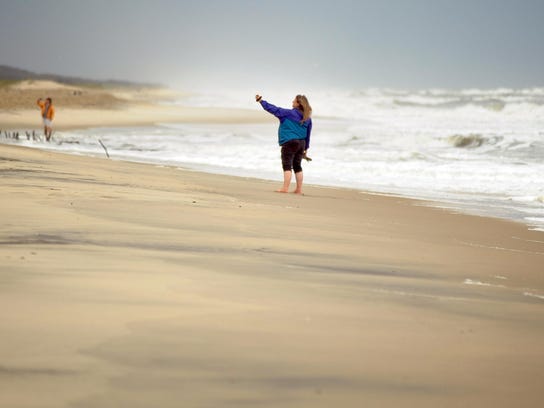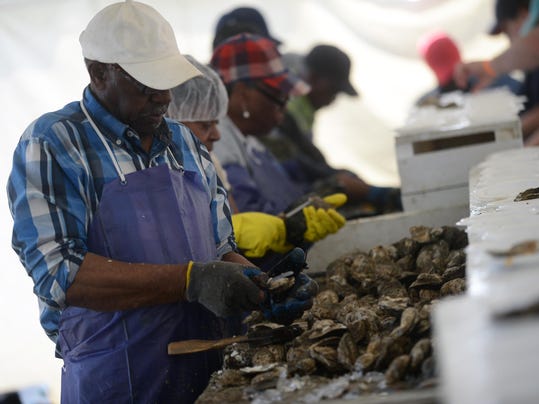Strict Standards: Only variables should be assigned by reference in /home/noahjames7/public_html/modules/mod_flexi_customcode/tmpl/default.php on line 24
Strict Standards: Non-static method modFlexiCustomCode::parsePHPviaFile() should not be called statically in /home/noahjames7/public_html/modules/mod_flexi_customcode/tmpl/default.php on line 54
Strict Standards: Only variables should be assigned by reference in /home/noahjames7/public_html/components/com_grid/GridBuilder.php on line 29
Chincoteague, Md., officials are preparing to respond to a plan that could put an end to commercial fishing, aquaculture and the horseshoe crab harvest within the boundaries of Assateague Island National Seashore.
Assateague Island National Seashore Superintendent Deborah Darden presented an overview of a draft general management plan for the national seashore — including the proposed prohibition on commercial seafood activities — to the Chincoteague Town Council on Sept. 17.
“There is this regulation that says unless Congress says it’s specifically allowed, it’s not allowed. ... For 50 years, we have not enforced this,” Darden said, adding, “Our Washington folks are telling us that these are activities we should look at winding down.”
About 1,260 acres of aquaculture activity is within the park boundary, she said, adding, “Unfortunately, that includes Tom’s Cove.”
Chincoteague council members were not happy about the idea of the federal government prohibiting commercial fishing and aquaculture in waters where it has been allowed for the 50 years since the national seashore was established.
“The people in Washington are eating Chincoteague oysters and clams,” said Councilman John Jester, noting major grocery chains in the Washington, D.C., area are customers of Chincoteague seafood businesses.
“The leases have been handed down for generations. ... It goes all the way back to the Baylor Grounds. ... The initial legislation for the seashore recognized the business,” he said.
The town will send a letter to Virginia Gov. Terry McAuliffe and other elected officials, protesting the idea of prohibiting commercial fishing and aquaculture in the area, Mayor Jack Tarr said. Additionally, the town’s lobbyist was directed to start researching regulations related to the matter, Tarr said, noting, “We need to start looking at all our options.”
Use of areas within the national seashore by the seafood industry is not only an historic reality, Tarr said, “It’s a way of life for current working watermen. ... Fight for it because it is a way of life for these people.”
News of the upcoming release of the plan, expected sometime in the first two weeks of October, came less than a week after the U.S. Fish and Wildlife Service released its final comprehensive conservation plan for Chincoteague National Wildlife Refuge — a document which when adopted will guide management decisions at the refuge for the next 15 years. The wildlife refuge plan proposes to relocate Assateague’s recreational beach north from its current location.
The two federal agencies together oversee the Virginia portion of Assateague Island.

Susanna Lewalski of Safety Harbor, Florida takes a selfie on the beach at Assateague Island, Virginia on an overcast Friday, Sept. 12, 2014. (Photo: File photo by Jay Diem)
The national seashore plan will adopt the U.S. Fish and Wildlife Service plan for the recreational beach in Virginia.
Assateague Island National Seashore is about 50,000 acres and extends from Maryland into Virginia, including both land and water within its boundaries. More than 2 million people a year visit the national seashore.
While the state of Virginia owns the bottomland offshore, the national seashore controls the water column in both ocean and bay waters within the national seashore’s boundaries, Darden told the town council in a presentation.
“We need to respond better to the natural processes, the fact that the island is moving westward,” she said as one reason for the new management plan. The plan will give four alternatives for future management of the national seashore, ranging from a continuation of current management practices all the way to letting the island evolve naturally, which ultimately would lead to a more primitive island experience.
Darden gave a similar presentation earlier in the week to working watermen, which Accomack County Supervisor Wanda Thornton attended.
Thornton at Wednesday’s Accomack County Board of Supervisors meeting said it was “disheartening” to hear about the plan. She noted Tom’s Cove shellfish are their own brand.
“If there is anything that’s good for the Eastern Shore, it’s aquaculture and keeping the waters clean,” Thornton said, adding, “If it happens on Chincoteague, what effect is it going to have on the Eastern Shore?”
States are given legal authority to permit and regulate shellfishing in any waters in the national seashore, but the National Park Service says it controls the water column and that commercial fin-fishing and aquaculture are prohibited in the areas unless Congress specifically authorizes them — which it has not at Assateague.
Additionally, the two-week horseshoe crab harvest also is not allowed under the existing regulations because horseshoe crabs are arachnids, not crustaceans, and therefore are classified as wildlife, according to the National Park Service.
The draft plan will recommend that the National Park Service consult with Maryland and Virginia “to assess commercial fin fishing and aquaculture” and said the agency would work with the states “to wind down these activities over time — probably a generation,” according to the presentation.
“NSP believes a collaborative approach undertaken over years — and possibly many years — is the best way to recognize and honor the long history and importance of these uses in the region while meeting NPS law and policy,” it said.
There will be a public review and comment period after the draft plan is released in October. The final version of the plan is expected to be ready next summer.
Read or Share this story: http://usat.ly/1KpCcMY
Strict Standards: Only variables should be assigned by reference in /home/noahjames7/public_html/modules/mod_flexi_customcode/tmpl/default.php on line 24
Strict Standards: Non-static method modFlexiCustomCode::parsePHPviaFile() should not be called statically in /home/noahjames7/public_html/modules/mod_flexi_customcode/tmpl/default.php on line 54
Find out more by searching for it!

